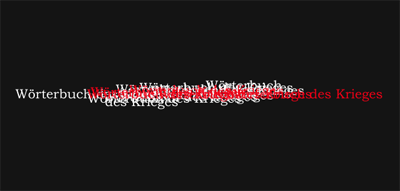
The Dictionary of War project takes as its impetus the refrain of philosophers Gilles Deleuze and Felix Guattari, "At least, when we create concepts, we are doing something." Whether read as a statement of looming powerlessness or a celebration of the power of theory, the argument makes a fittingly anxious backdrop for the collaborative Dictionary of War, which gathers scientists, artists, theorists, and activists to create an alphabetical index of "key concepts that either play a significant role in current discussions of war, have so far been neglected, or have yet to be created." These include terms like "Stance", in which filmmaker Khalo Matabane compares what it means to take a stance in combat and to take a stance as an artist; "Disappeared", in which Sylvere Lotringer considers what truly happens to disappeared soldiers, and the fact that, despite periods of invisibility, "the war is never over"; or "Pleasure", in which Avi Mograbi explores the perceptions of ex-soldiers regarding their military experiences and the often unspoken "pleasure of controlling other people with the tips of your fingers." The project began in 2006 as not only a publication, but more importantly a public forum in which to discuss the terms at hand, and a website that functions as platform for the presentation of entries and video archives. In the last two years, sessions have been held in Frankfurt, Munich, Graz, and Berlin to discuss and debate the lexicon of conflict. This year, the project moves further east, to Novi Sad, a thriving creative center which has become an important point of congregation for artists and activists. On January 25th and 26th, the new media center, Kuda will play host to the newest iteration of the project, which features contributions by a range of impressive participants, including Hans Bernhard, Galit Eilat, Geert Lovink, Martha Rosler, and Florian Schneider. If you can't make it, visit the highly engaging online archives, for this and previous years. - Marisa Olson


+++
This sounds like an interesting website! I think the main example would be "Art," which applies to the arts of war as well as the arts of peace, as represented in statuary at the bridge in Washington DC. Making it all the more confusing, "art" and "army" come from the same root in Indo European:
Etymology: ME < OFr arte < L ars (gen. artis), art < IE base *ar-, to join, fit together > arm, arm, articulate, ratio, L artus, joint
In the field of rhetoric, which I believe is one of your areas of study Marisa, Gorgias is well known for saying that all use of language is violent. This is akin to what Foucault said in that there is no such thing as communication free from domination. I don't agree with these necessarily but I do think in normal practice they are generally true. Most Postmodernists disagree with Habermas when he says that you can have intersubjective communication free from domination. They are I think correct by default because human society still needs coercive restraint to avoid chaotic warlordism, thus all discussion takes place in a context of laws enforced by power, and so on.
One counterpoint would be the idea of sacred communication as Ceci Moss has studied (according to her bio on Rhizome), which occurs without domination although proper authority is included. Eastern religion also talks about zen and peace, and the expressive activity that can accompany it, and it has been backed up by brain science.
Come to think of it, communication is perhaps the ultimate military word, especially for the 21st century! "Network" of course is also at the very core of present-day military theory and practice.
Max Herman
The Genius 2000 Network
Le Cafe online now
http://www.geocities.com/genius-2000
+++
+++
Another thought I had, "freedom" = "freedom to maneuver" in warfare as well as relating to rules of engagement I think, such as a "free-fire" zone. "Technology" I think has a relevant corollary in "the strategy of technology" as in the book by Stefan Possony at http://en.wikipedia.org/wiki/Strategy_of_Technology.
I understand that the site is not just interested in words that apply to both war and art, but some items reflect this.
Max Herman
The Genius 2000 Network
Le Cafe online now
http://www.geocities.com/genius-2000
+++
+++
I visited this site and it's pretty good. I would add "balance of power" to the list as I think this is a very important concept relating to war. All in all a very interesting project!
Max Herman
The Genius 2000 Network
Le Cafe online now
http://www.geocities.com/genius-2000
+++